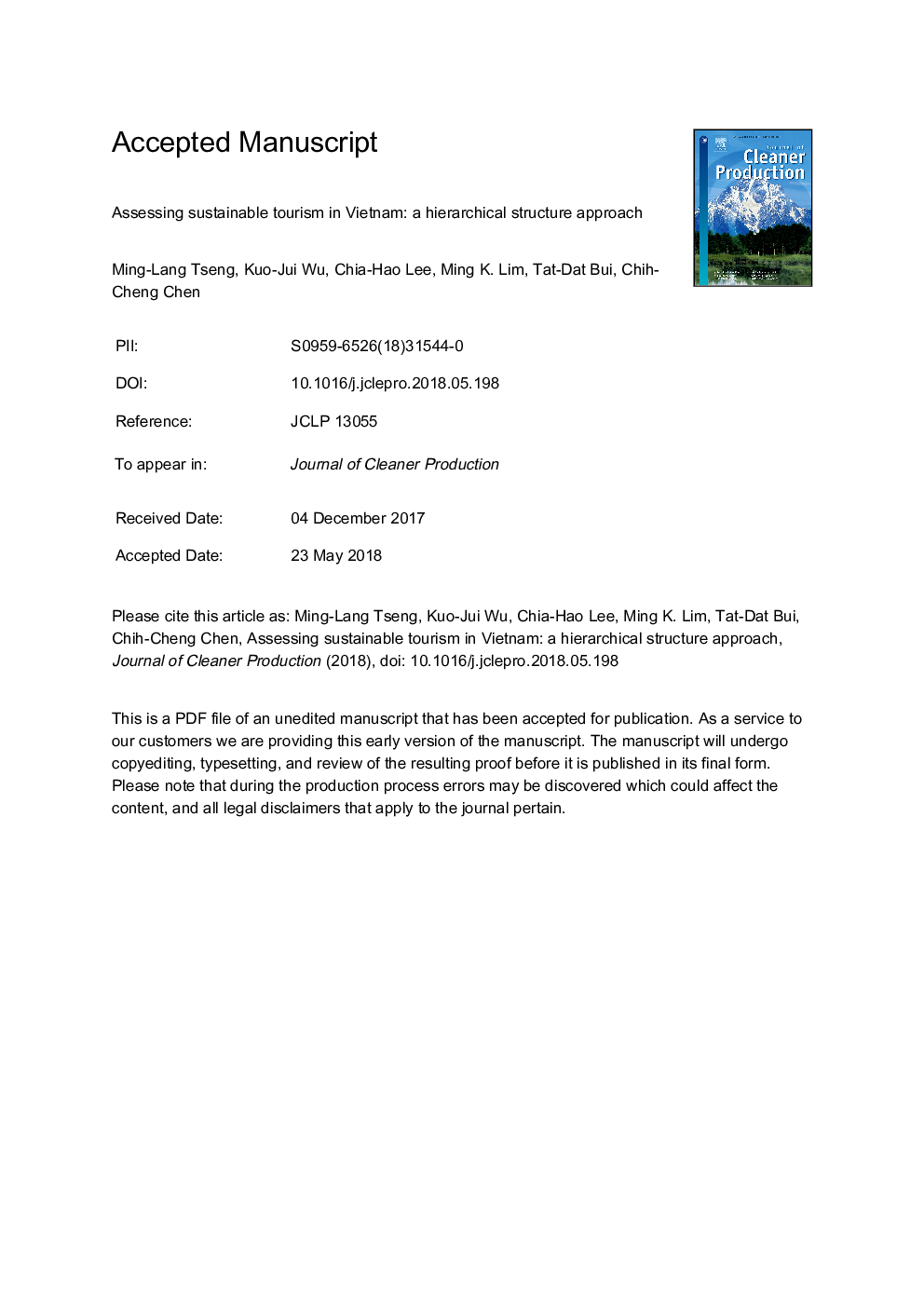| کد مقاله | کد نشریه | سال انتشار | مقاله انگلیسی | نسخه تمام متن |
|---|---|---|---|---|
| 8094060 | 1522058 | 2018 | 30 صفحه PDF | دانلود رایگان |
عنوان انگلیسی مقاله ISI
Assessing sustainable tourism in Vietnam: A hierarchical structure approach
ترجمه فارسی عنوان
ارزیابی گردشگری پایدار در ویتنام: یک رویکرد ساختاری سلسله مراتبی
دانلود مقاله + سفارش ترجمه
دانلود مقاله ISI انگلیسی
رایگان برای ایرانیان
کلمات کلیدی
ترجمه چکیده
گردشگری پایدار به دلیل عدم اطمینان، آلودگی محیط زیست و تحویل محصولات گردشگری ناخوشایند و خدمات منسجم، موقت و ناکافی توجه زیادی را از بخش های دانشگاهی و تجاری به دست آورده است. با این حال، با توجه به عدم اطمینان، همکاری یک ویژگی مهم در صنعت گردشگری از لحاظ پایداری است. گرچه بسیاری از ویژگی ها در ادبیات مورد توجه قرار گرفته اند، ساختار اندازه گیری جامع در این بخش ناشناخته باقی مانده است. این مطالعه تلاش می کند تا روابط علی بین ویژگی ها را ارزیابی کند، روابط بین سلسله مراتبی را کشف و قدرت هایی را شناسایی کند که وابستگی را در میان ویژگی ها به منظور بهبود عملکرد پایدار با استفاده از یک روش ترکیبی از نظریه مجموعه فازی، یک محاکمه تصمیم گیری و ارزیابی و مدلسازی ساختاری تفسیری. مجموعهای از چهار جنبه اجتماعی-فرهنگی، اقتصاد، محیط و همکاری- که شامل 24 معیار هستند، از ادبیات معرفی شده و بر اساس نظرات کارشناسان است. نتایج بدست آمده نشان می دهد که همکاری قویترین عاملی است که دیگران را در گردشگری پایدار رانندگی می کند و نشان می دهد که رفاه اجتماع، فرهنگ مهمان، اشتراک اطلاعات، شفافیت و همسویی انگیزه، بیشترین سطوح رانندگی و قدرت وابستگی را در ساختار صنعت. این ویژگی ها در افزایش کارایی پایدار صنعت موثر هستند. علاوه بر این، پیامدهای نظری و مدیریتی برای افزایش ارزش یافته های ما مورد بحث قرار می گیرد.
موضوعات مرتبط
مهندسی و علوم پایه
مهندسی انرژی
انرژی های تجدید پذیر، توسعه پایدار و محیط زیست
چکیده انگلیسی
Sustainable tourism has been receiving increasing attention from the academic and business sectors due to uncertainty, environmental pollution, and the delivery of uncreative tourism products and fragmented, temporary and inadequate services. However, due to the uncertainties, collaboration is a critical attribute in the tourism industry in terms of sustainability. Although many attributes have been addressed in the literature, a comprehensive measurement structure remains unexplored in this sector. This study attempts to evaluate the causal inter-relationships among the attributes, explore the hierarchical inter-relationships and identify the powers that drive dependence among the attributes to improve sustainable performance by employing a combined method of fuzzy set theory, a decision-making trial and evaluation and interpretive structural modeling. A set of four aspects-socio-cultures, economics, environments, and collaborations-that include 24 criteria are introduced from the literature and are based on experts' opinions. The results obtained show that collaboration is the strongest causal attribute driving the others in sustainable tourism, revealing that community well-being, guest cultures, information sharing, transparency, and incentive alignment have exhibited the greatest levels of driving and dependence power in the structure of the industry. These attributes are the most effective at enhancing the industry's sustainable performance. In addition, theoretical and managerial implications are discussed to enhance the value of our findings.
ناشر
Database: Elsevier - ScienceDirect (ساینس دایرکت)
Journal: Journal of Cleaner Production - Volume 195, 10 September 2018, Pages 406-417
Journal: Journal of Cleaner Production - Volume 195, 10 September 2018, Pages 406-417
نویسندگان
Ming-Lang Tseng, Kuo-Jui Wu, Chia-Hao Lee, Ming K. Lim, Tat-Dat Bui, Chih-Cheng Chen,
